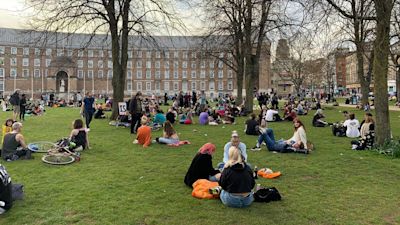People gather in Bristol for fourth ‘Kill the Bill’ protest

People have gathered in Bristol for a fourth ‘Kill the Bill’ protest in the city.
Following three demonstrations in the city, protesters announced two further demonstrations would take place this week.
Tuesday's gathering on College Green started around 6pm.
Avon and Somerset Police, who have been criticised for their handling of previous demonstrations, said they had put a plan in place to “manage” the events.
In a tweet, the force said: "Our officers have engaged with a number of people who have gathered on College Green in Bristol for a planned protest.
"Around 100 people are in attendance so far. Our aim is to facilitate a peaceful protest which complies with the legislation.
Ahead of the protest, Supt Mark Runacres urged organisers to work with the police.
“We would encourage any protest organisers to engage with the police so we can help them ensure any protests are legally compliant, while also minimising the risk to the general public during this health emergency," he said.
He added: "Policing plans will be in place to manage the two protests should they go ahead and specially trained protest liaison officers will attend and look to work with those gathered."
What is 'Kill The Bill'?
People have been demonstrating against a proposed Police, Crime, Sentencing and Courts Bill, which would give police increased power to stop protests.
The Bill also makes a special new law to protect monuments and statues, in the wake of the toppling of the statue of Edward Colston, with the crime of damaging them punishable by up to ten years in prison.
Under new government proposals trespass would become a criminal offence - rather than being a civil matter - in order to tackle unauthorised encampments, giving police the power to seize vehicles and arrest people who refuse to move.
Those breaking the new law on trespass could be fined up to £2,500 and could face a prison sentence of up to three months, but concerns have been raised by both academics and organisations that the new law will disproportionately affect travellers and more widely those living on roadside camps.
Read more: